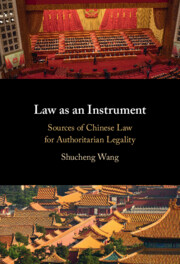Book contents
- Law as an Instrument
- Law as an Instrument
- Copyright page
- Dedication
- Epigraph
- Contents
- Figures
- Tables
- Preface and Acknowledgements
- Abbreviations
- 1 Introduction
- 2 A Dual Constitution with Illiberal Characteristics
- 3 Judicial Interpretation as a de facto Primary Statute for Adjudication
- 4 The Judicial Document as Informal State Law
- 5 Guiding Cases as a Form of Statutory Interpretation
- 6 Bureaucratization of Judicial Precedents
- 7 Concluding Reflections
- Appendix: Methodology and Data
- Bibliography
- Index
6 - Bureaucratization of Judicial Precedents
Published online by Cambridge University Press: 07 July 2022
- Law as an Instrument
- Law as an Instrument
- Copyright page
- Dedication
- Epigraph
- Contents
- Figures
- Tables
- Preface and Acknowledgements
- Abbreviations
- 1 Introduction
- 2 A Dual Constitution with Illiberal Characteristics
- 3 Judicial Interpretation as a de facto Primary Statute for Adjudication
- 4 The Judicial Document as Informal State Law
- 5 Guiding Cases as a Form of Statutory Interpretation
- 6 Bureaucratization of Judicial Precedents
- 7 Concluding Reflections
- Appendix: Methodology and Data
- Bibliography
- Index
Summary
This chapter investigates judicial precedents in China’s instrumentalist legal system and finds that judges are generally reluctant to refer to a judicial precedent, including a guiding case, in the process of making a judicial decision. It further reveals that the guiding case system has effectively crystallized a bureaucratic system of judicial precedents with guiding cases at the top of the pyramid. A bureaucratic system of this kind is grounded primarily in the political hierarchy of the courts and a nationwide typical-case-selection movement, in which the lower courts are politically responsible for submitting a certain number of typical cases selected from within their respective jurisdictions to the Supreme People’s Court every year. Finally, it attempts to develop a bureaucratic theory of judicial precedents centred on guiding cases that fits into China’s authoritarian context and that differs substantially from any other type of case law in a liberal context.
Keywords
- Type
- Chapter
- Information
- Law as an InstrumentSources of Chinese Law for Authoritarian Legality, pp. 137 - 161Publisher: Cambridge University PressPrint publication year: 2022

